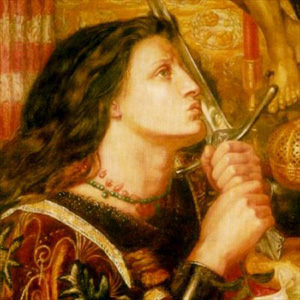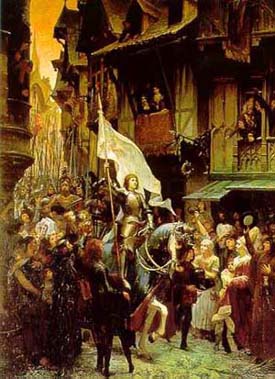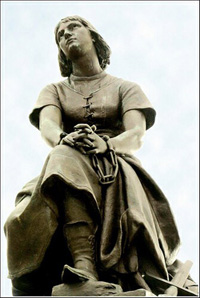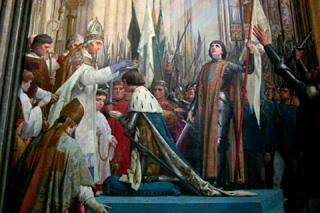 |
History: Personalities
The Timely Mission of St. Joan of Arc
Pierre Virion
Certainly Joan of Arc is one of the best known personages of the 15th century, thanks to the great quantity of documents we have about her. We have both the process of her condemnation (1431) and the papal process of her rehabilitation (1456). In the latter are statements from 114 witnesses of her life, work and martyrdom.

The Maid of Orleans' mission is relevant for our days |
In addition to the chronicles, reports and correspondence of that time are the many later historical studies, such as the highly regarded work of Quicherat (1843), who published the text of the two trials of Joan. I am not counting the many works dedicated to her process of beatification (St. Pius X, 1909) and canonization (Benedict XV, 1921).
Alongside these valuable works of serious historians, however, today we find disreputable authors who look for easy commercial success by exploiting the sensational. They have the undisguised intent of presenting a false image of the Saint and her history.
Why are these attacks being made? I would propose that it is because the Maid of Orleans’ sanctity and political mission - completely opposed to the agenda of the modern Revolution - are very timely. She cannot be tolerated because her message is too timely!
The Saint, who at her time faced political problems similar to those we confront today, resolved them with answers that could help us resolve ours. Some facts from the history of her short life give us means to understand this.
Repudiating the Revolution
During the childhood and youth of Jeannette, as she was known in Domrémy, the village where she was born, she was assisted by St. Michael the Archangel and other Saints who appeared to her, revealing her vocation to liberate France, which had been invaded by the English. Orleans, Beaugency, Patay, Jargeau were successive victories that opened to that 17-year-old Maid the triumphal road to Rheims, where she would see Charles VII crowned.
This was followed by the time of her imprisonment, suffering and virginal immolation in the fire of Rouen. These varied aspects give her mission an epic character marked by miracles and also a sublime mystical note, which leads us to compare her brief existence to the life of Christ. Keeping the proper proportions, the comparison is impressive.

Her triumphal entrance in Orleans |
The similarity of the troubles of her time with those of our days is also striking. Joan had to deal with the Revolution, resolve an important international problem and face the crisis that afflicted the Church, paying the price of her life.
At Joan’s time, the Revolution was everywhere. It was in England, in Flanders, in France; it was defended by communist theologians (yes, already at that time!) and by unscrupulous politicians such as Wat Tyler in London, Caboche and Cauchon in Paris. The savage Hussite war was shaking Germany. Internal fighting divided Spain. Venice and Genoa, as well as Florence and Rome, were combating one another in Italy. In France a bloody rivalry had been unleashed between the Armagnacs and the Bourguignons.
The Duke of Burgundy, chasing the dream of making a kingdom for himself with French provinces stolen from his King, betrayed the latter by allying himself with the English. The Revolution was supported by princes, nobles, and important French State bodies that were working for the foreign King. It was supported also by university professors spreading disorder in minds and favoring the triumph of a demagogy, of which they wanted to take advantage.
Joan reestablished order, union and peace by raising the enthusiasm, veneration and recognition of the people and an ardent national sentiment free of rivalries and revolutionary principles. She has, therefore, the right to ask us an account of our position before that same Revolution - the Revolution that started in her time, continued in the Church [with Luther in 1517], then in the State in 1789 [with the French Revolution] and finally in all society in 1917 [with Communism].
The Maid never made any compromise. She repudiated social atheism because she restored the authority as a factor of unity and peace, and proclaimed the submission of that same civil authority to God. In Chinon she asked Charles to deliver his kingdom to God in a contract of vassalage. In Rheims she saw the King crowned under her standard representing Christ the King. She was a prophetess of our destinies; she taught us that the salvation of nations cannot be found in the fight for secular interests, but in the public affirmation of the Catholic Faith and its observance.
Proclaiming the Kingdom of Christ
Pius XII said that the vocation of Joan of Arc led her to be involved in international problems. This was also the opinion of her contemporaries. The structures of Christendom were threatening to disappear and be replaced by a new Europe, different from what it had been. After the annexation of the old French kingdom to the English Crown, the next step would be remodeling the nations by force.

A triumph followed by martyrdom |
England was the principal agent of this change. Its victories in France during the Hundred Year War had assured it the submission of the principal powers of the continent by a series of pacts signed in 1416. The English Monarch was already called King of France and England, and had added to his ambition the conquest of Bavaria, Naples and the markets of the Middle East. He dreamed to have three capitals: London, Paris and Jerusalem.
It was then that the miracle of Orleans suddenly put a halt to those projects. Without Joan of Arc, an international order based on the primacy of economics over politics and religion could have been installed in the 15th century. We would have seen Catholicism excluded from society and replaced by an order quite similar to the global order we are being dragged into today. Powers without faith or country would have indoctrinated men in a humanitarian creed, which would have transformed the world into a kind of anti-Christendom, extending its power over all peoples.
By saving her homeland, Joan of Arc preserved the West from that insupportable threat. She is not only a model of patriotism, but also of true union. She defended an international order turned toward God. Joan imagined the universal Kingship of Christ from the perspective of a fraternal union of nations. In Rheims she called all nations to unite under the Reign of the “King of Heaven, who is also the King of the World.”
“You will be imprisoned,” her voices told her close to the walls of Melum: Strange words, with a mysterious meaning. Her suffering in Rouen is also the testimony of the veracity of her mission and is the coronation of her political work. The Great Schism of the West had just ended, and the Council of Constance had already made an attempt to proclaim the supremacy of councils over the Pope. The Council of Basel, which followed it, ended in rebellion. It was men who had been at those two councils - partisans of the English plan - who directed the process against the Maid.
We know the spirited answers of Joan, especially that one - repeated three times - to those proud and vain ecclesiastics who called her fidelity schism. “I serve God first,” she told them.

Restoring the King under the authority of Christ |
And when they tried to draw her into an error about the Church Triumphant and Church Militant, pretending that she must submit to them because they were the Church Militant, she replied that for her the two could be but one Church with the same faith, doctrine, grace and goal. The one Church from Heaven unites with the Church on earth in the oneness of the Mystical Body of Christ: “It is my sense that it is all one. Why do you make difficulties about it?” What a beautiful lesson for our century!
Joan does not belong only to France. Impressed by her drama, the world adopted her as a superior creature who left after her a wake of light. She continues to live amid us today as she lived in her century. Many points make her present among us - she repaired the disasters of the Hundred Year War, she prevented the collapse of Catholic thinking, she erected a wall against Luther, she made sublime values incarnate, and she kept Europe faithful to its proper mission. Is it not fair to say that without her we would not be what we are now?
Affirming this, we confess the divine content of History. Behold now, when the Revolution reaches its fullest development and presents an extreme danger, Joan reappears. She reappears, the mystical flower and virgin warrior, with the strength of her mission of integrating all politics into the unity of the Christian message. Herald of Christ the King, she proclaims His kingdom to peoples and factions. No other Saint has raised the doctrine of this royalty so high.
God made her the great political Saint for the nations of all time. We should not be insensitive to the present value of her message.

Translated from Catolicismo, March 1975
Posted November 26, 2010

Related Topics of Interest
 St. Joan of Arc St. Joan of Arc
 A Distorted View of the Maid of Orleans A Distorted View of the Maid of Orleans
 Red, White and Blue Red, White and Blue
 An Encyclical to Foster the Revolution An Encyclical to Foster the Revolution
 John Paul II Blesses the UN John Paul II Blesses the UN
 Benedict Pays Homages to the United Nations Benedict Pays Homages to the United Nations


|
History | Home | Books | CDs | Search | Contact Us | Donate

© 2002-
Tradition in Action, Inc. All Rights Reserved
|
 |
|